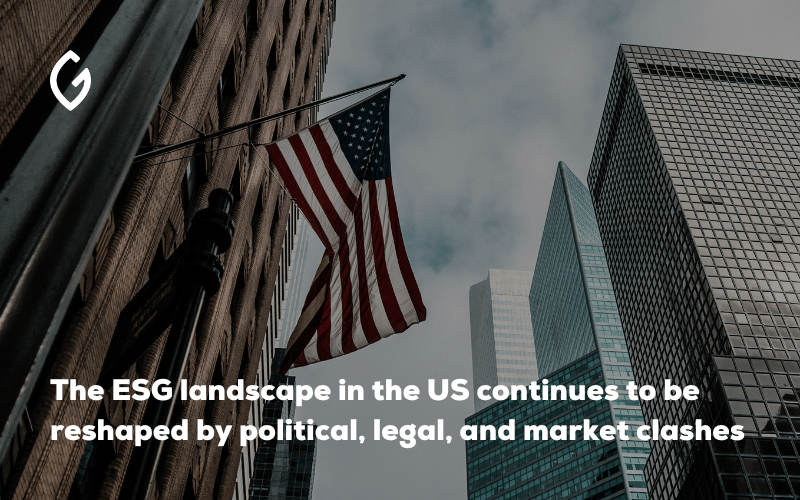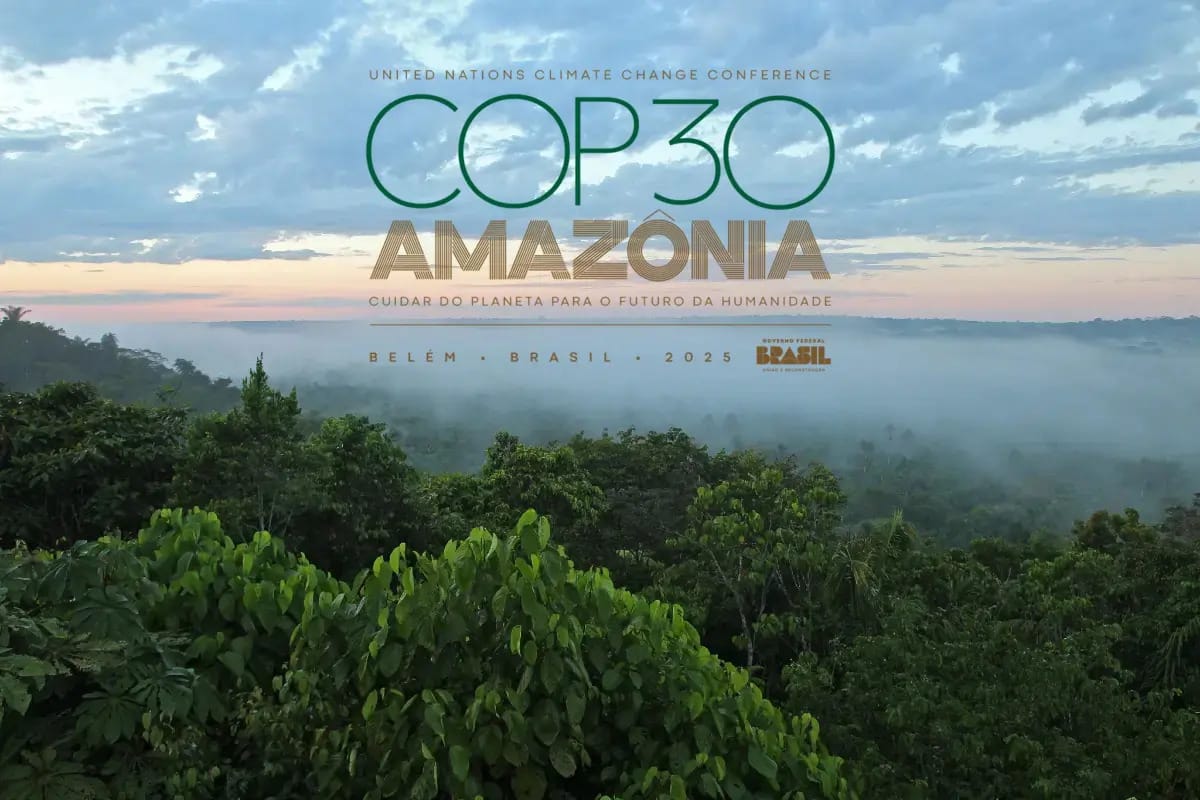- Green Digest
- Posts
- What's Happening in Sustainability & ESG (Week Recap 19.08 - 25.08) 🌎
What's Happening in Sustainability & ESG (Week Recap 19.08 - 25.08) 🌎
The ESG landscape in the US continues to be reshaped by political, legal, and market clashes

This week’s read time: 8 minutes
Welcome to this edition of Green Digest, where you will get updated about everything happening in the Sustainability & ESG space in less than 10 minutes. 🌎
We go through tons of articles and data from the most reliable sources, filter & simplify them, and serve them to you in bite-sized chunks every week. 🍀
In this edition, we’ll cover:
• A wave of political, legal, and market clashes is continuing to reshape the ESG landscape in the US 🇺🇸
• We Mean Business Coalition says business presence at COP30 in Brazil is vital and is urging companies to show up 🌎
• Google detailed the energy use and emissions of AI text prompts, calling for common standards to track AI’s footprint 📊
• Norway’s $2T wealth fund divested nearly $3B from Caterpillar and five Israeli banks over ethics concerns 🇳🇴
• and other news 🌍
PRESENTED BY REUTERS EVENTS
Reuters Events: Sustainability Reporting USA 2025 (October 9–10, Boston)
Now a cornerstone in the ESG calendar, Reuters Events: Sustainability Reporting USA 2025 (October 9–10, Boston) convenes 300+ senior ESG, finance, and legal leaders to shape the next chapter of sustainability disclosure. With a legacy of delivering practical, actionable content, the event equips professionals to navigate regulatory change, from SEC climate rulings to CSRD alignment. Learn how AI and data governance can elevate your ESG strategy, and how to communicate transparently with investors and stakeholders. With 50+ executive speakers and 65% senior attendance, this is your opportunity to build on trusted foundations and lead the future of sustainable reporting.
THIS WEEK’S TOP NEWS
Regulatory Oversight & Industry Insights

🇺🇸 A wave of political, legal, and market clashes is continuing to reshape the ESG and sustainability landscape in the US, as the Trump administration persists in opposing ESG measures and undermining renewable energy expansion, and stakeholders across the spectrum mount their response.
Democratic finance chiefs push back
A coalition of 17 Democratic finance officials, representing over $3 trillion in pension fund assets, sent a letter to BlackRock and 17 other major financial institutions urging them to reaffirm climate risk oversight. Organized under Americans for Responsible Growth, the group’s message directly counters a Republican-led letter calling on asset managers to drop net-zero and sustainability considerations. The officials argue fiduciary duty requires long-term risk management and accountability, stressing that investors must hold corporations responsible for climate, governance, and supply chain risks.
Trump’s war on wind escalates
Offshore wind was the latest casualty when the Interior Department abruptly ordered Denmark’s Ørsted to halt its nearly completed $1.5 billion Revolution Wind project off Rhode Island. The 65-turbine farm, 80% built and set to power 350,000 homes, was blocked on vague “national security” grounds, sending Ørsted’s stock to record lows and jeopardizing its $9.4 billion rights issue. Local governors vowed to fight the decision, but the move fits Trump 2.0’s wider hostility to renewables, with new political reviews, national security probes of imported turbines, and hints at pipeline-linked dealmaking. Industry groups warn the order sends a chilling message that the US is no longer a reliable place for long-term clean energy investment.
Trade deal concessions on EU sustainability rules
In a new US-EU Framework Agreement on Reciprocal Trade, the EU pledged to ease corporate sustainability rules — including the CSDDD, CSRD, and the EUDR, technically confirming that the rules are now part of the deal. The bloc committed to reducing administrative burdens, softening liability and transition obligations, and avoiding undue restrictions on transatlantic trade, including for US companies already meeting domestic standards. Critics warn the EU is scaling back core ESG regulations as part of geopolitical dealmaking.
California presses ahead with disclosure rules
Despite the national turbulence, California regulators are moving forward with landmark climate disclosure laws. The California Air Resources Board (CARB) will release draft rules for Senate Bills 253 and 261 on October 14, with board review in December. The rules will force nearly 7,000 firms to report Scope 1 and 2 emissions by June 2026 (with Scope 3 later) and biennial climate risk reports for companies with at least $500 million in revenue. Annual compliance fees are set at $3,106 for SB 253 and $1,403 for SB 261, with exemptions for nonprofits and telework-only firms. Multiple legal challenges have already failed, making it clear: the deadlines stand, and companies must prepare.
Legal and civil rights battles intensify
Proxy advisers Glass Lewis and ISS have sued Texas over a new law restricting their ability to advise shareholders on ESG and DEI matters, calling it unconstitutional and harmful to their business. Meanwhile, Democratic attorneys general from California, Arizona, and Massachusetts are challenging the EPA’s attempt to rescind the 2009 endangerment finding, the legal backbone of US greenhouse gas rules, warning it relies on “scientifically unsound” analysis. Civil rights groups also condemned Trump’s threats to cut Smithsonian funding unless it downplays slavery, arguing the administration is erasing history and undoing decades of social progress. Together, these actions underscore a widening clash between Trump’s deregulatory agenda and defenders of climate accountability, shareholder rights, and civil rights.
PRESENTED BY ECONOMIST IMPACT
Economist Impact’s Sustainability Week Europe
October 6th-7th, 2025 | Amsterdam
Economist Impact’s Sustainability Week Europe, brings together leaders in business, policy and innovation to share case-studies, insights and ideas about climate solutions that work for business and the planet. With more than 120 speakers, 500 in-person attendees, 25 case studies, the Sustainability Week Europe presents original insights and practical solutions. Meet the most influential industry leaders, policymakers and innovators.
Event website link
Registration link
Discount code for Green Digest readers = GD-SWE20
MORE INTERESTING NEWS
Latest developments, reports, insights, and trends

Credit: Forster Communications
🌎 Business participation at COP30 in Brazil is critical to advancing global climate goals, according to the We Mean Business Coalition, which has issued its first-ever public call urging companies to attend. The coalition warns that without a strong corporate presence, negotiations risk being dominated by fossil fuel lobbies and producing targets without clear implementation paths. Business engagement has historically strengthened climate outcomes — from corporate backing that enabled the Paris Agreement at COP21, to sectoral pledges on coal, EVs, and deforestation at COP26, and unified calls to phase out fossil fuels ahead of COP28. The coalition argues that companies bring practical insights on how policy translates into investment and infrastructure, helping align public ambitions with private capabilities. With global clean energy investment forecast at $2.2 trillion in 2025 and mounting physical risks from extreme weather threatening trillions in business losses by mid-century, corporate voices are needed to anchor policy in real-world delivery. Despite logistical challenges in Belem, including limited transport and accommodation, businesses are urged to be visible either on-site or through satellite events in São Paulo and Rio, with Latin American firms seeing a rare opportunity to influence the global climate agenda from their region.
🟢 Direct air capture (DAC) is under pressure after Climeworks’ Orca project in Iceland received a Tier 3 rating (the lowest available) from Calyx Global for “over-crediting.” The issue stems from failing to fully account for embodied emissions from construction and manufacturing, which were amortized to allow early credit issuance. Calyx warned this undermines accounting integrity and urged delaying crediting until emissions are neutralized. While only 856 credits (most bought by Microsoft) have been issued, the concerns extend to larger upcoming projects like Climeworks’ Mammoth in Iceland and 1PointFive’s STRATOS in Texas. Despite this, DAC still rates highly for additionality and sequestration reliability, with buyers advised to pair credits with supplementary offsets.
Meanwhile, Norway’s Northern Lights carbon capture and storage (CCS) project has begun operations, injecting CO₂ 2,600 meters beneath the seabed in a milestone for the Longship initiative. Backed by Shell, Equinor, and TotalEnergies, Phase 1 can store 1.5 million tons annually (37.5 million over 25 years) and is fully booked with CO₂ sourced from Heidelberg Materials’ Brevik cement plant. The partners committed ~7.5 billion Norwegian crowns ($744 million) to Phase 2, expanding capacity by an additional 3.5 million tons per year.
WHAT ARE COMPANIES DOING?
Corporate sustainability, new tools and services & companies in the news
📊 Google unveiled detailed measurements of the environmental footprint of AI text prompts in its Gemini Apps assistant and called for greater industry consistency in accounting for AI’s impacts. The company reported that the median Gemini text query uses the same energy as watching less than nine seconds of TV, five drops of water, and emits 0.03 grams of CO₂. Efficiency improvements over the past year cut per-prompt energy use 33-fold and emissions 44-fold, though the analysis doesn’t yet cover video or image generation or the energy-heavy process of training models. Google emphasized its methodology includes idle chip energy and data center overhead, offering a “full stack” view of AI’s footprint. While per-query efficiency has improved, overall AI-driven demand for data centers is rising fast, with US projections suggesting they could consume up to 12% of electricity by 2028. Google hopes sharing its methods will push the industry toward more transparent and standardized sustainability reporting on AI.
🚙 Rivian is set to resume work on its long-paused $5-billion electric vehicle manufacturing plant in Social Circle, Georgia, with construction slated to begin next year. The 16-million-sq-ft facility, to be built in two phases on an 1,800-acre campus by contractor Clayco, will ultimately add capacity for 400,000 vehicles. Initially announced in 2021 and later paused following financial losses, the project is backed by a $6.6-billion federal loan and a $1.5-billion state incentive package, requiring Rivian to invest at least $5 billion and create 7,500 jobs by 2030.
EVERYTHING FINANCE
Sustainable finance, funding rounds, acquisitions & private equity deals

Norway’s central bank (Norges Bank) building in Oslo, Norway | Credit: Victoria Klesty/Reuters
🇳🇴 Norway’s $2 trillion sovereign wealth fund has divested nearly $3 billion from Caterpillar and five Israeli banks over ethics concerns tied to the war in Gaza and West Bank settlements. The fund cited “an unacceptable risk” that Caterpillar’s bulldozers are being used in the unlawful destruction of Palestinian property, while the banks — Hapoalim, Bank Leumi, Mizrahi Tefahot, First International Bank of Israel, and FIBI Holdings — were excluded for financing settlement construction deemed illegal by the UN’s top court. The move underscores the fund’s strict adherence to ethical guidelines set by Norway’s parliament, which prohibit investment in companies complicit in serious rights violations during war and conflict. The decision follows Caterpillar’s plan to resume machinery deliveries to Israel and the banks’ ongoing role in underwriting settlement projects.
💬 An ISSB board member warned that proposed changes to Europe’s sustainability reporting rules could weaken global alignment. Jenny Bofinger-Schuster said the EU’s July 2025 proposals risk divergence by allowing companies to omit quantitative disclosures of anticipated financial effects, leaving only qualitative data. She argued this would harm interoperability and deprive investors of decision-useful information. By contrast, ISSB Standards retain quantitative requirements while offering proportionality mechanisms to reduce reporting burdens. Bofinger-Schuster urged EU lawmakers to align with ISSB’s framework to avoid duplicative reporting and ensure transparency on how sustainability risks affect financial performance, cautioning that regulatory “simplifications” could backfire if they erode comparability.
Funding rounds:
🚢 Overhaul, a global leader in in-transit supply chain risk management, raised $105 million in Series C equity funding. Overhaul protects more than $1.4 trillion in trade with a 99.9% protection rate through real-time monitoring, predictive intelligence, and rapid response.
🪪 Corporate security software firm Ontic has raised $230 million in a Series C funding round led by KKR as it looks to expand globally and into the government sector. Ontic, whose platform helps companies protect executives, prevent workplace violence, and manage travel risks, has seen rising demand as organizations prioritize proactive threat detection following high-profile corporate security incidents.
Did you like today's newsletter? |
Seeking impartial news? Meet 1440.
Every day, 3.5 million readers turn to 1440 for their factual news. We sift through 100+ sources to bring you a complete summary of politics, global events, business, and culture, all in a brief 5-minute email. Enjoy an impartial news experience.
PARTNER WITH US

Increase your brand awareness and visibility by reaching the right audience and target market. Showcase your company, solutions, services, products, reports, surveys, events, or other content in front of our highly targeted audience of +5,000 Sustainability & ESG professionals. Contact us at [email protected] if you think we can partner in some way.


